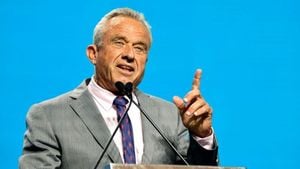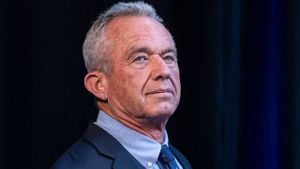The COP29 summit, held recently from November 12-14, 2024, in Baku, Azerbaijan, painted a stark and concerning picture of the global climate crisis. Amidst discussions among world leaders, scientists presented alarming data indicating the world's greenhouse gas emissions showed yet another increase. According to estimates, 2024 is set to release approximately 37.4 billion metric tonnes of carbon dioxide (CO2), marking a 0.8% rise from the previous year, as reported by Euro News.
CO2, the principal greenhouse gas emitted through human activities, plays a significant role in climate change. While it's necessary for maintaining the Earth's temperature, excessive levels lead to enhanced greenhouse effects, contributing to global warming. Once released, CO2 can linger in the atmosphere for thousands of years, meaning its impact is both immediate and long-term. Shockingly, the global concentration of CO2 reached around 419 parts per million (ppm) earlier this year, along with methane levels steadily rising to 1922 parts per billion (ppb).
Scientists assert urgent measures must be taken, indicating the world must cut emissions by 42% by 2030 to have any chance of limiting warming to 1.5 degrees Celsius. Currently, the Earth’s temperature is already close to 1.3 degrees Celsius above pre-industrial levels. Seminal climate scientist Mike O'Sullivan from the University of Exeter warned, "We need to massively increase ambition and actually just think outside the box on how we can change things, not be so tied to fossil fuel interests." His statements highlight the increasingly urgent need for action as countries appear not to be adequately reducing emissions.
Delving deeply, the data revealed the primary culprits behind global emissions as China, the United States, India, and Europe. China alone contributes about 32% of the world's annual carbon emissions, with its output remaining largely unchanged or even decreasing expectedly soon. Meanwhile, India’s emissions have spiked by 4.6%, making it imperative to seek solutions. For the United States, emissions dropped slightly by 0.6%, driven mainly by reduced reliance on coal and oil. Conversely, Europe managed to lower its emissions by 3.8%, largely due to significant reductions attributed to coal.
For the Maldives, the situation is particularly dire. Recognized as the lowest-lying country globally, rising sea levels pose imminent threats to its very existence. During the COP29 summit, the Maldivian President Dr. Mohamed Muizzu emphasized the need for innovative financial strategies to tackle climate crises. He outlined the failure of traditional lending mechanisms, asserting they do not adequately support Small Island Developing States (SIDS) like the Maldives, which struggle to secure necessary resources for climate action.
Dr. Muizzu proposed radical solutions to revamp global financial systems, including linking debt forgiveness to achieving climate resilience targets. He insisted on redefining credit ratings, allowing nations to garner support based on climate resilience rather than conventional economic indicators.
Focusing on the Maldives, the archipelago faces multifaceted challenges primarily concerning water. Many northern islands deal with water shortages during the dry season, particularly from April to May, whereas southern islands frequently experience flooding. Currently, about half of the country’s population resides on Malé, which is just 1.4 square kilometers wide, making logistics for emergency relief both complicated and costly.
With no rivers or streams available for water supply, most islands rely on rainwater, supported by desalination efforts or reliant on expensive bottled water. Nearly half of the inhabited islands had to receive emergency water shipments during dry seasons. The 2004 Tsunami and rapid urbanization have contaminated groundwater, leaving inhabitants scrambling for alternative water sources.
Meanwhile, the UNESCO-designated biosphere reserve at Baa Atoll, inhabited by around 12,000 people, has become pivotal for ecological efforts. The reserve encompasses some of the largest coral reef systems, playing pivotal roles by providing biodiversity and acting as natural barriers against stronger waves. Significant ecotourism has blossomed here, contributing some resilience against the onslaught of climate change's impacts.
At COP29, President Muizzu stressed the urgent need for more realistic targets and the creation of comprehensive systems to allow carbon trading capabilities among nations, aimed at increasing resources for adaptation strategies and mitigation efforts for SIDS. This would explore the potential for creating new revenue streams through innovative funding mechanisms.
Despite the gloomy outlook, technically speaking, experts have made clarifying strides concerning the measurement of warming. A new method developed highlights how human-caused warming may have actually passed 1.5 degrees Celsius earlier than previously asserted. Utilizing air samples from ancient Antarctic ice has allowed scientists to reassess historical CO2 concentrations—stressing the importance of accurate baselines to grasp how much has changed over the years. This change emphasizes the stark reality humanity faces, balancing our development and ecological impact.
Contrasting the need for action against rising emissions, the urgency among countries attending the summit reiterated their reliance on fossil fuels, which poses challenges to achieving the global warming targets. The tension provides fertile ground for discussions urging silver linings and innovations among developing countries, particularly low-lying islands barely squeaking out survival from the impact of climate change.
While the leaders convened to share insights and strategies, environmental organizations echoed calls for comprehensive reforms and immediate actions to address the climate emergency. The future outcome of this gathering at COP29 and others rests delicate like the ecosystems of Maldives, the anticipation of upcoming discussions morphing challenges and transforming them toward solutions prioritizing sustainability over business as usual.



